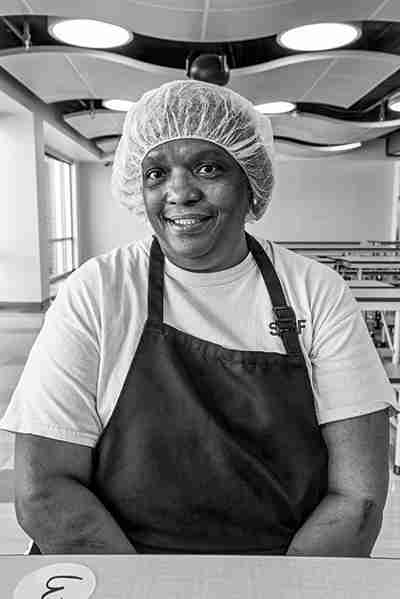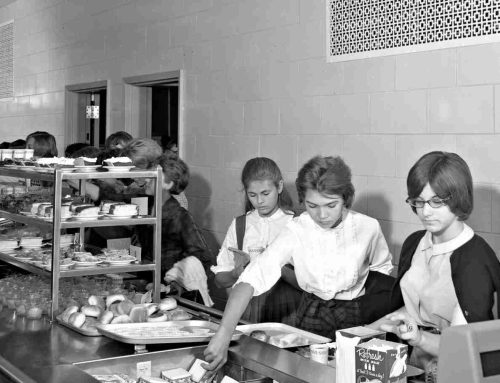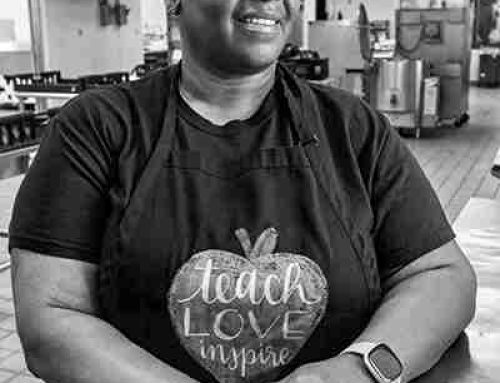Listen to the interview with Diane and Aaron Henkin from WYPR.
Name: Diane Blick
Job title: Cafeteria Manager I
Photograph location: photographed at Dorothy I. Height Elementary School
Years of service: 23
The idea is that once you get them to try something new, most of the time, they like it. And they’ll ask for it again. You got broccoli today? Yes, I do. You can have broccoli, carrots, collard greens, string beans, corn. It’s to get them to begin to eat right. This helps them to learn to eat the correct way. – Diane Blick
Diane Blick_Dorothy Height Elem_09-02-21
Transcript of Diane Blick’s interview with Aaron Henkin by Rev.com
Diane Blick:
Okay. My name is Diane Blick. I’m Cafeteria Manager One. I run the cafeteria. And I love what I do. I’ve been in the system for 23 years.
Aaron Henkin:
Tell me what school you’re at.
Diane Blick:
Dorothy Heights Elementary. School number 61.
Aaron Henkin:
Take me back to the beginning of your career path here into the food nutrition world. How’d you end up doing this kind of work?
Diane Blick:
Okay. When I took the job at Baltimore City, it was because I wouldn’t have to pay a babysitter. I would be working the same hours that they would be in school and off on the weekends. So that’s my initial coming in. But then once I got in, I began to work and I loved it. And I’m still here 23 years. I said I was just going to do it until my kids got old enough and I wouldn’t have to work at… I would find another job. But I stayed, and I love it.
Aaron Henkin:
What do you love about it? What’s kept you here 23 years?
Diane Blick:
The excitement of the children. I have seen kids… I now have children that I did them, they are now parents and I have their kids. And one of the ladies, I met her on the street and she said, you know you got my babies. I was like, oh my goodness. She said, but they fine, because you serving. And I say, oh, well, thank you. And it’s like a generation. I’m now in the second generation. And maybe possibly y’all might still be around for the third generation of families coming through. And it’s just nice to know that some people that may not have food is able to get food.
Aaron Henkin:
Yeah. Talk to me a little bit more about… You say you started this job because the hours were convenient for you. I imagine some point along the way you realized how important this job was. Talk about what’s important about what you’re doing. What gives you purpose?
Diane Blick:
What gives me purpose is being able to feed… Some children their first meal they get up to date would be with us. So we now give them breakfast, lunch, supper, and snack. So that should hold them until they get home. And on Fridays, we give extra food for the ones that take it home to cover them for the weekend. And, then some people never get introduced to different kinds of foods, different fruits and vegetables, some vegetables they may not never try at home, but they’ll get a chance to try it here. And then they could ask for it when they got home, which would help them become healthy and strong.
Aaron Henkin:
Talk a little bit more about that, that role you guys serve as not just servers of food, but nutritionists. I mean, you talk about the science that goes into what you’re serving these kids, the foods you’re choosing and what it takes to get them to broaden their horizons, I guess.
Diane Blick:
Okay. Well, I tell them everything that’s here I tried it. And it’s good. Try it because if you don’t like it, then you can throw it away and try something else. But the idea is that once you get them to try something new, most of the time, they like it. And they’ll ask for it again. You got broccoli today? Yes, I do. You can have broccoli, carrots, collard greens, string beans, corn. It’s to get them to begin to eat right. Because we have a lot of obese children and this helps them to learn to eat the correct way. So they won’t end up being obese.
Aaron Henkin:
Walk me through an average day at work. I mean, talk about everything that goes into making this kitchen hum, and doing what you need to do every day.
Diane Blick:
Okay. Today I got here at 6:30. Breakfast is at 7:30. I served a little Pre-K and Kindergartners downstairs we have two service areas of breakfast. And Ms. Hood serves here in the cafeteria. Today, we already set up for tomorrow breakfast and we’re doing lunch now. I’m setting up, we set up our breakfast in advance. So in case if somebody called out, we still be able to flow with the breakfast. And breakfast is the most important meal of the day. It will start them off. They’ll be able to learn more because they can concentrate. They’re not hungry. They can concentrate on what they are doing.
Diane Blick:
So we make sure that we give them a nutritional breakfast and we encourage them to also be on time so they can get breakfast. And even if they’re late, we still give them breakfast because that’s the best part of it. And today’s lunch, we have a chicken salad and we have the other choices, turkey and cheese sandwich. We have carrots and tomatoes as the vegetable, and we’ll have some celery as well. We have oranges and apples as the fruit. So they’ll have a choice of what they want. We have all three different kinds of milk, skim milk, fat free, and we have chocolate milk.
Aaron Henkin:
Talk about what the kids’ favorite items are. What do you know you’ve got to have extra on hand because it’s going to go flying off the shelves?
Diane Blick:
Pizza and chicken nuggets. They love pizza and they love chicken nuggets. They love chicken patties, especially pizza. And usually, well, not right now because it’s cold, but on the 20th, we’ll start with the hot food. And every Friday is pizza Friday. So it seems like everybody comes to school on Fridays.
Aaron Henkin:
It’s my favorite too. I wonder if you might have… So 23 years. I wonder if there’s a story along the way during those 23 years about, and you don’t need to use the student’s name, but a student that you sort of developed a special bond with, or maybe a student who reminded you how important your work was?
Diane Blick:
I don’t remember his name anyway, but it was a young man that always every day in the cafeteria, he would, for some reason, he would be fighting every day. And I said, you know what? I’m going to spend more attention to him. So when he came in, I said, come here, you getting breakfast this day. He was like, yes. He used to be like, mean, you know mean? I was like, why you mean this morning? Come on, let’s get breakfast. You going to be my special friend from now on. He just looked at me and he got his breakfast. I said, make sure you get everything. I said, matter of fact, you want another piece of fruit? And because they can get as much fruit as they want, but he didn’t know that he thought that he was getting special treatment. So I gave him some more fruit.
Diane Blick:
I said, now, if you want another piece, just call me. And he was like, okay. So this went on for a week. And I started noticing that his attitude was coming down. I said, good morning. And he’d be like, because I just said it to him and he felt special. And he kept coming through and about three weeks I noticed, he ain’t been out there fighting. And he was like, no, he ain’t fight all month. I was like, ah, I say, oh, just a little me paying a little attention to him. And he started eating the lunch too. He calmed down and he wasn’t fighting anymore.
Diane Blick:
So I was like, okay, you’re my number one student now. And he just smiled. I didn’t know he had a sister, he introduced me to his sister, he say, that’s my sister. I said, oh, you number two, okay? And she just smiled, but she was already calm, but he wasn’t. But now they both was calm and smiling and coming through. So by me just paying a little attention to him, changed his whole attitude.
Diane Blick:[crosstalk 00:07:29] It made me feel like my job was important because if I could just change one child or encourage one child, it’s good. And that was one of my stories.
Aaron Henkin:
I wonder if you might talk about the past year and a half, the pandemic, and how that changed work for you?
Diane Blick:
The pandemic, it was really a big change. And it was really hard because we had to actually serve. And when we first started, the National Guards was here. And we would make the bags up and the National Guard would actually pass them out. And it was a lot more work because we had to get them breakfast, lunch, snack and stuff all at one time. And then different families had… It was a lot, it was a lot of work. But we appreciated that we still had a job. Most people didn’t work and we were still working and we was feeding the community. So it wasn’t just the students, everybody got to get that bag. Children, adults, everyone got it. And they seemed happy and they appreciated it. So it made, even though we did more work, we know it was all worth it.
Aaron Henkin:
What do you want people like average people to understand about what you and your colleagues do? What do you think some of the misconceptions are about food nutrition workers, what you do and what you don’t do?
Diane Blick:
I think they think that is not important, the work that we do. But if a lot of children didn’t eat… There’s a lot of kids that are starving and some kids are even homeless, but homeless kids can still come to school and they can still eat. And so our job is very important. We are not only feeding people, we’re giving them food and nutrition, and giving them new values, food values. A lot of us, even when I was coming up, a lot of the things that we didn’t eat. And I found out about when I became working in the cafeteria.
Diane Blick:
So it’s opened up new things. It gets you to try new things, try new… I’ll go in a restaurant now, maybe Mexican, and I never ate Mexican food. I said, but I’ll go in there and try it because I know I encourage people to try. So I need to try new things as well. So it helps me try new things and helps the children try new things. And all of my workers, they all love working here too. Ms. Murray has been here 35 years. Lita’s been here, I think about 20, like me and Ms. Hood just got here this week. But I think she’s been in the system for 15 years. So we all love what we do. And the most important thing is to see a child smile.
Aaron Henkin:
Last question for you. You’ve been in this career path for 23 years. How do you think this job has changed you inside as a person?
Diane Blick:
It’s changed me inside because now I’m a servant. It helps you. It shows you how to be a servant and it’s better to serve than to receive. I’d rather give out. And that’s what I do. Anything that I can give out. Energy, well, we can’t hug now, but we used to go hug. They would run and hug you and you could hug them. Now we’ve got to do the elbow. But just to know that somebody cares about you at school is just not we’re serving you and you need to eat this food, you need to do this and that. But we also love the children and we love what we do.



